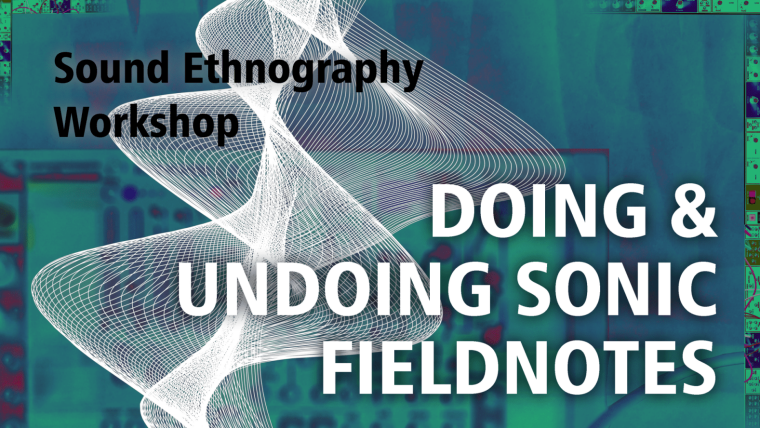
Meldung vom:
Call for Participation: Sound Ethnography Workshop
Am 23.05.2024 ist Dr. Alastair Mackie an der Uni Jena zu Gast, um im Rahmen des Workshops "Doing & Undoing Sonic Fieldnotes" zusammen mit den Teilnehmenden das kreative Potenzial von Audiosamples in multimodaler ethnografischer Forschung auszuloten. Die Veranstaltung findet im Rahmen des Seminars "Kulturtechniken der Simulation" (Leitung: Anne Dippel, Sarah Thanner) statt und ist auch für externe Teilnehmende geöffnet – wir freuen uns über Anmeldungen bis zum 15.05.2024 (noch 10 freie Plätze).
- Anmeldung: Registrierung bis zum 15.05.2024 per E-mail an marlen.lutter@uni-jena.de.
- Rückfragen: Rückfragen können gerne an sarah.thanner@uni-jena.de gerichtet werden.
- Ort und Zeit: 16-20 Uhr, Seminarraum Accouchierhaus, Jenergasse 8, 07743 Jena.
- Workshopsprache: Englisch
Workshopbeschreibung
This workshop will encourage participants to do and undo audio recordings from the field using sample-based synthesis and composition. Reflecting on our sonic fieldnotes, we will explore how engaging creatively with sound might expose us to unseen parts of our field and how this can inform our research.The field is filled with multiple sounds which encourage scientific as well as creative sampling. Can both approaches inform each other? What kind of new harmonies and rhythms can we detect in our data which allow us to gain unheard, and perhaps also unseen insights (Mackie 2024)? How can they transform our modes of writing in times of transition (Dippel 2022)?
In this interactive workshop we will engage with sonic field samples. Recording audio has long been important in ethnographic fieldwork but it is usually anathema to change samples in any way. In music however there is a long tradition of adapting samples for audio synthesis and new compositions. Can we, as ethnographers, also use samples to compose sonic fieldnotes? And could sample-based synthesis expose hidden parts of our field data which we otherwise might not have heard? Extending from sonic ethnography (Gershon 2018), participants will explore the creative potential of fieldwork recordings. Introducing participants to ‘deep listening’ (Oliveros 2005), we will question what we hear and how we listen in the field. Participants will then be encouraged to record different locations in Jena and to collect audio. Using an app designed for recording and mangling samples, we will compose sonic fieldnotes. Afterwards we will discuss what we can learn from our explorations which we might have missed using other methods, and how this can inform our understanding of the field.
References
- Dippel, Anne (2022): "Stein-Zeit. Was heißt Ethnografie schreiben heute?", In: Österreichische Zeitschrift für Volkskunde LXXVI/125 (Heft 2), p.194–242.
- Gershon, Walter S. (2018): "Reverberations and Reverb: Sound Possibilities for Narrative, Creativity, and Critique", In: Qualitative Inquiry 2020, Vol. 26(10), p. 1163–1173
- Mackie, Alastair (2024): ‘On cultivating sound: Sampling, morphogenesis, and a creative sonic ethnography’, In: M. Nic Craith, K. Strani, and A. Mackie (Hg.) Heimatkunde: Explorations of place and belonging. Münster: LIT Verlag, p. 264–275.
- Oliveros, Pauline (2005): Deep Listening: A Composer’s Sound Practice. Lincoln, NE/Kingston, NY: iUniverse/Deep Listening.